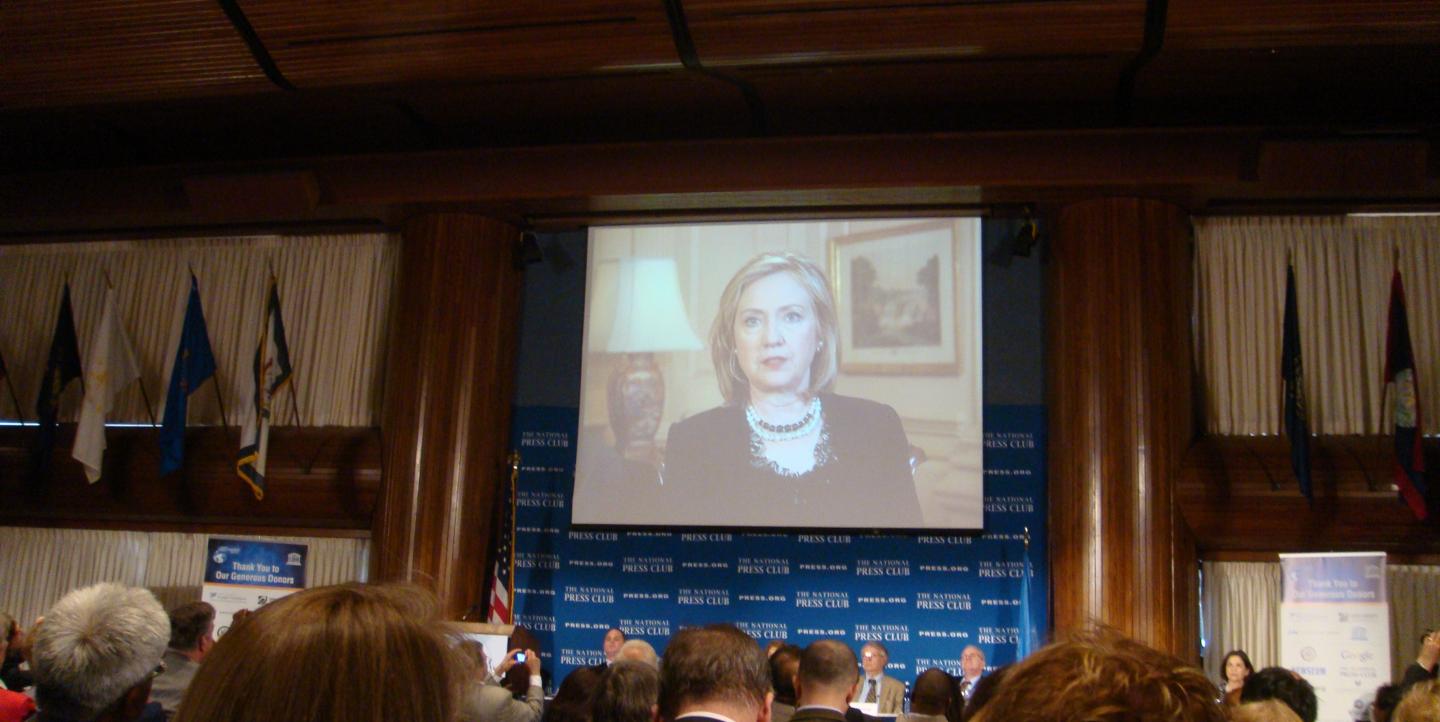Ahmad Zeidabadi is not allowed to write.
But the imprisoned Iranian journalist received the UNESCO/Guillermo Cano World Press Freedom Prize at a ceremony at the National Press Club Tuesday for his dedication to democracy, human rights and freedom of expression.
Zeidabadi’s award marked the end of a three-day conference held in Washington, D.C., commemorating World Press Freedom Day.
Zeidabadi’s case serves as a stark reminder that millions of citizens and journalists around the world risk retribution for speaking their mind.
In 2009, the Iranian government arrested and tried Zeidabadi on charges of plotting to overthrow the state. After completing his six-year prison sentence, Zeidabadi will face five years of internal exile and a lifetime ban on all political, civil and journalistic activities.
Zeidabadi could not attend the ceremony, but issued a statement through UNESCO, the United Nations Educational, Scientific and Cultural Organization.
“In the performance of my profession, I had no means but my pen and my speech,” Zeidabadi wrote in the statement read aloud at the ceremony. “In using these means I never went beyond the narrow and limited confines of the Iranian government’s laws and regulations. But, in violation of their own laws and regulations, they have imposed pain and suffering beyond my endurance – pain and suffering resembling those of a person who is crucified for weeks or buried alive.”
UNESCO Director-General Irina Bokova said Zeidabadi “embodies the very spirit of freedom of expression.”
Zeidabadi, who holds a doctorate in international relations from Tehran University, has worked for a variety of Iranian publications and has taught political science. He has been arrested and imprisoned multiple times.
Established in 1997 and named for the slain Colombian journalist, the Guillermo Cano prize honors a person, organization or institution for an outstanding contribution to press freedom, particularly amid hostile conditions. The Cano and Ottoway family foundations as well as JP/Politiken Newspaper LTD finance the $25,000 prize. An independent jury of 12 journalists from around the world selects the winner.
Continuing the conference’s focus on social media, YouTube messages for Zeidabadi from four previous Cano award winners interspersed the presentation. In a taped message, U.S. Secretary of State Hillary Clinton congratulated Zeidabadi and celebrated journalists.
“His absence gives us a fitting occasion to reflect on the principles he stands for,” she said. “By exposing abuses of power, challenging assumptions and providing constructive outlets for new ideas and for dissent, journalists safeguard our freedoms.”
Around 700 people gathered in Washington for the conference, which featured speakers from 28 countries. More than a dozen panel discussions explored the evolving marriage between Internet tools and media principles.
UNESCO’s Bokova summarized the conference takeaways:
- Freedom of expression in the digital age cannot flourish without strong legal and societal frameworks.
- Information does not equal knowledge. Digital literacy, education and training are vital to impart journalistic standards to an empowered citizenry.
- Freedom of expression needs quality and diversity, and its principles must be respected off and online.
You can read more of IJNet's ongoing coverage of World Press Freedom Day here.
The United Nations Education, Scientific, and Cultural Organization (UNESCO) organizes World Press Freedom Day commemorations to celebrate the fundamental principles of press freedom; to evaluate press freedom; to defend the media from attacks on their independence and to pay tribute to journalists who have lost their lives in the line of duty. For complete information on the 2011 World Press Freedom Day global conference in Washington DC, see www.wpfd2011.org (in English)

